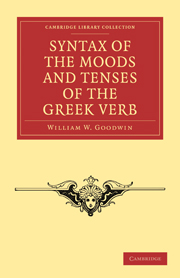Book contents
- Frontmatter
- PREFACE TO THE SECOND EDITION
- Contents
- CHAPTER I GENERAL VIEW OF THE MOODS
- CHAPTER II USE OF THE TENSES
- CHAPTER III THE PARTICLE ῞AN
- CHAPTER IV USE OF THE MOODS
- CHAPTER V THE INFINITIVE
- CHAPTER VI THE PARTICIPLE
- CHAPTER VII VERBAL ADJECTIVES IN -τέος
- APPENDIX I
- APPENDIX II
- INDEX TO EXAMPLES
- ENGLISH INDEX
- GREEK INDEX
CHAPTER VI - THE PARTICIPLE
Published online by Cambridge University Press: 07 September 2011
- Frontmatter
- PREFACE TO THE SECOND EDITION
- Contents
- CHAPTER I GENERAL VIEW OF THE MOODS
- CHAPTER II USE OF THE TENSES
- CHAPTER III THE PARTICLE ῞AN
- CHAPTER IV USE OF THE MOODS
- CHAPTER V THE INFINITIVE
- CHAPTER VI THE PARTICIPLE
- CHAPTER VII VERBAL ADJECTIVES IN -τέος
- APPENDIX I
- APPENDIX II
- INDEX TO EXAMPLES
- ENGLISH INDEX
- GREEK INDEX
Summary
§ 107. The Participle has three distinct uses:–first, it may express a simple attribute, like an ordinary adjective (§ 108); secondly, it may define the circumstances under which the action of the sentence takes place (§§ 109–111); thirdly, it may form part of the predicate with certain verbs, often having a force resembling that of the Infinitive (§§ 112, 113).
Remark. As the Infinitive may be considered as a verbal noun, so the Participle is always a verbal adjective; both alike retaining all the attributes of a verb which are consistent with their nature. See § 90.
§ 108. 1. The Participle, like any other adjective, may qualify a noun.
In such expressions it must often be translated by a finite verb and a relative, especially when the Participle is preceded by the article. E. g.
Πόλις κάλλει διαφέρουσα, a city excelling in beauty. Ἀνὴρ καλῶς πεπαιδευμένος, a man who has been well educated. οἱ πρέσβεις οἱ παρὰ Φιλίππου πεμφθέντες, the ambassadors who had been sent from Philip. Ἂνδρες οἱ τοῦτο ποιήσοντες, men who will do this.
Ἐν τῇ Μεσσηνίᾳ ποτὲ οὔσῃ γῇ, in the land which was once Messenia. See § 16, 2. Στρατεύουσιν ἐπὶ τὰς Αἰόλου νήσους καλουμένας, they sail against the so-called Aeolian islands, lit. the islands called those of Aeolus.
- Type
- Chapter
- Information
- Syntax of the Moods and Tenses of the Greek Verb , pp. 213 - 232Publisher: Cambridge University PressPrint publication year: 2010First published in: 1867



